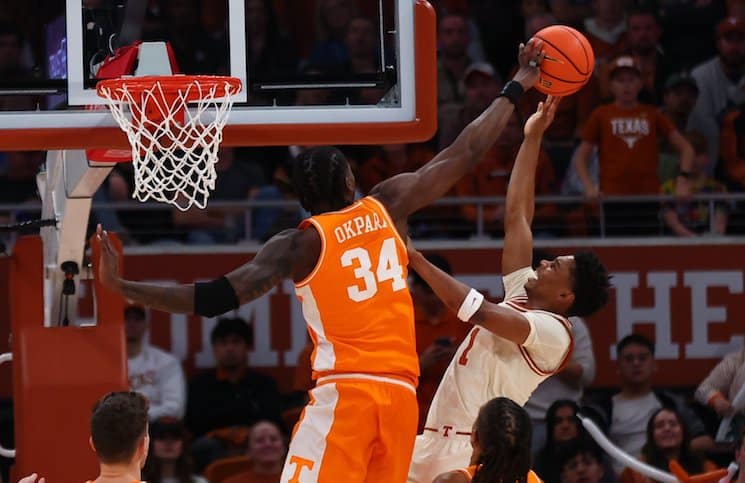
This Week in UT Sports History is a weekly column written by RTI contributor Lexie Little
Summer marks times of change for many universities and athletic departments. This week, the University of Tennessee welcomes a new chancellor, Donde Plowman, who returns to Rocky Top after serving as executive vice chancellor and chief academic officer at the University of Nebraska. Sixteen years ago to the day, the Mike Hamilton era began in Tennessee Athletics as he took over as director.
Take a look back at that pivotal change and more in “This Week in UT Sports History.”
July 1, 2003
After 18 years at the helm, former Tennessee head football coach Doug Dickey ended his tenure as athletic director on June 30, 2003, paving the way for Mike Hamilton to step into the role the following day. And Dickey’s performance would prove a tough act to follow.
Dickey, who coached at UT from 1964 to 1969, led the Vols to two SEC championships as head coach. He also commenced the traditions of the “Power T” on helmets, running through the “T” created by the Pride of the Southland Marching Band, and checkerboarded end zones. Notably, Dickey recruited wide receiver Lester McClain, the man who first integrated the Tennessee Volunteer football team and paved the way for countless players after.
As AD, Dickey oversaw Neyland Stadium’s expansion to surpass 100,000 seats and construction on Thompson-Boling Arena, Lindsey Nelson Baseball Stadium, and the Goodfriend Tennis Center to develop elite programs. National championship titles marked his tenure, one for football in 1998 and three for UT men’s indoor and outdoor track teams. Baseball also went to the College World Series twice.
(Women’s sports also flourished during that time under former athletic director Joan Cronan, with six titles for Lady Vol basketball; the men’s and women’s athletic departments remained separate entities until 2009).
In 2001, UT expected to seek both a new university president and athletic director. However, then acting President Eli Fly announced Dickey agreed to a one-year contract extension to enable an easier transition.
“I am happy that Doug has agreed to stay another year,” Fly said in the campus press release. “The success of our teams, the management of our program and the expansion of our athletic facilities speak to the job he has done.
“This agreement will give the new president the opportunity to be involved in selecting Doug’s successor.”
All good things must come to an end.
On July 1, 2003, 11-year athletic department veteran Mike Hamilton stepped into the role upon Dickey’s retirement, creating a pivotal point in UT’s narrative. An NCAA investigation and expensive hires and dismissals marred his eight years as athletic director, and many point to his decisions as the catalyst for the decline in Tennessee’s football dynasty – beginning with the decision to fire longtime head coach (and now athletic director) Phillip Fulmer.
Fulmer’s dismissal in 2008 required a $5.85 million contract buyout, leaving Tennessee athletics at a $3.2 million loss for the 2008-09 fiscal year.
“Football is the financial engine driving the train,” Hamilton said in early 2010. “It has a tremendous impact on our ability to be successful in all of our 20 sports.”
That engine failed.
Hamilton hired Lane Kiffin in December 2008. After only one season at Tennessee, Kiffin resigned to take the same position at the University of Southern California, leaving Tennessee without a head coach and with a relatively cheap buyout payment of $800,000. Hamilton then made the controversial hire of Derek Dooley, who despite his touted SEC lineage, held a losing record at Louisiana Tech.
Coaching tumult complicated Hamilton’s position, but a 26-month National Collegiate Athletic Association investigation into football and men’s basketball fractured any semblance of structure. Lane Kiffin and basketball head coach Bruce Pearl committed a series of recruiting violations that resulted in an initial self-imposed two-year probation and an additional two years of probation levied by the NCAA, placing limitations on recruiting and development.
Hamilton resigned June 7, 2011.
July 6, 2009
Some good did persist during Hamilton’s tenure as athletic director. In Belgrade, Serbia, Lady Vol swimmer Michele King earned a gold medal in the 400m free relays during the first day of competition at the 2009 World University Games.
King had earned her way onto the U.S. team a year prior at the 2008 U.S. Open Championships. Two of her relay teammates also came from SEC schools, Ava Ohlgren of Auburn and Morgan Scroggy of Georgia. Their fourth teammate, Madison Kennedy, competed collegiately at California.
The senior from York, Pennsylvania, earned 15 All-American awards prior to her senior season and won a SEC individual championship. She placed third at the NCAA Championships in the 50y free in March 2009 prior to the World University Games..
Following her gold medal in the 400m free relay, King won a bronze medal in the 50m free at a career-best 25.10. Short distance proved her strong suit, having placed runner-up in the 50y free at the NCAA Championships in 2008. Her “splash dash” set a school record and made her the seventh-fastest collegian in the event with an impressive 21.86 time.
Though the athletic department faced times of transition, King’s performance remained consistent as she continually earned school records and international accolades.
July 4, 2014
Though administration, coaches, and rosters change from year to year at Tennessee, the tradition of producing All-American athletes endures. And while the country celebrated Independence Day, then Tennessee baseball freshman Nick Senzel celebrated his second All-American award.
Perfect Game named Senzel to its Freshman All-American team as a second-team designated hitter. The Farragut native earned a .315 batting average during his first season at Tennessee, including 39 RBIs and 15 extra-base hits. His prior honor as an All-American came from Louisville Slugger on June 4, 2014.
Senzel also earned SEC All-Freshman honors. Plenty of recognition followed, leading major league executives and scouts to rate Senzel as a top prospect and a best hitter rating for the 2016 MLB Draft. The Cincinnati Reds selected Senzel as the second overall pick, and he made his major league debut on May 3, 2019.
Senzel’s freshman campaign proved unusual for more than just his early promise. Following his junior season at Farragut High School, he signed his National Letter of Intent to join the Georgia Bulldogs. However, the University of Georgia fired coach David Perno, and Senzel received a release from his letter of intent. When he committed to Tennessee on June 17, 2013, no scholarship money remained despite then head coach Dave Serrano’s scrounging. Senzel played his freshman season as a walk-on.
Now, that former Vol walk-on has earned eight major league home runs and 25 RBIs, batting .264 in his first season as the Reds’ center fielder.
Coaching changes at Georgia led to a Tennessee star, proving that sometimes, transition brings positivity…for some athletic department, at least.



